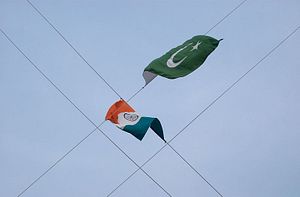While the Prime Ministers of India and Pakistan were preparing for their meeting in New York on the sidelines of the United Nations General Assembly, another set of leaders were in Islamabad, exploring new ways to improve the bilateral relationship. These were group of young leaders from a range of fields: politics, media, the arts, academia and medicine, who had been chosen by the Asia Society, New York as Fellows for the year 2013-2014, under the India-Pakistan Regional Young Leaders Initiative (IPRYLI). In all there were 11 individuals, five from India and six from Pakistan. The three-day conference in late September was a joint endeavor of the Asia Society and the Jinnah Institute in Pakistan. I had the good fortune of attending the conference.
There were two obvious differences between the meeting between the prime ministers and the brainstorming session in Islamabad.
First, Indian Prime Minister Manmohan Singh and his Pakistani counterpart Nawaz Sharif restricted their conversation to tensions across the Line of Control (LOC) and the terrorist attack in Jammu. In contrast, the young leaders in Islamabad were not bound by politics, and felt free to discuss a gamut of issues, although there was a focus on the visa regime, which affects ties in virtually every sphere, especially trade, education and tourism.
Second, both Singh (born 1932 in what is today Pakistan) and Sharif (born 1949) belong to the older generation. The young leaders meeting in Islamabad were not around to witness the wars of 1965 or 1971, and remember only the Kargil War of 1999 (which occurred during Sharif’s second stint as Pakistan’s prime minister). This meant that though they were naturally familiar with the terrible stories of partition and conflict, they carried less historical baggage. Many agreed that online jingoism is partly to blame for the acrimony between the countries.
The young leaders’ dialogue was remarkable in a number of ways.
For one thing, the individuals came from very different walks of life, and this ensured that the conversation did not focus excessively on any one sphere. As a consequence, there were discussions on a number of issues: easing visa regimes, facilitating student exchange, releasing prisoners and fishermen, recognizing the need for India and Pakistan to explore synergies in spheres such as medicine and law, and using social media for promoting meaningful dialogue.
Moreover, unlike many Indo-Pakistan exchanges, the dialogue was refreshingly unique, for the simple reason that none of the political and security issues that generally dominate discussions between the countries were given too much space, although they were mentioned.
Third, dialogues between India and Pakistan tend to ignore the perspectives of the diasporas of both countries. This is in spite of the fact that the diasporas have a significant impact on ties, acting as both spoilers and bridge builders. In this sense, the interaction in Islamabad was fortunate to benefit from a number of individuals who have been living overseas for a number of years. They include Mumbai-born Satchit Balsari, an emergency physician in New York, Priti Radhakrishan, a New York-based lawyer who is the director and co-founder of the Initiative for Medicine, Access and Knowledge (IMAK), and Sarah Hussain, a poet who now resides in Pakistan, but who has spent most of her life abroad.
Finally, the conference was interesting because apart from bilateral issues, it also considered the domestic problems shared by both India and Pakistan. This gave an insight into how many of the day-to-day challenges in law, healthcare and the status of women are very similar.
The message from the three-day conference was clear: Both countries need to live like normal neighbors, and the extreme positions on both sides must end.
Tridivesh Singh Maini is a New Delhi-based columnist, and independent policy analyst. He is also an Asia Society IPRYLI Fellow (2013-2014).

































